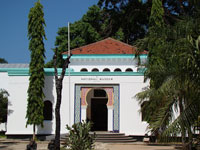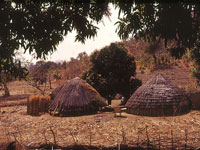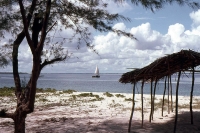Dar Es Salaam Travel Guide
Meaning 'Haven of Peace' in Arabic, Dar es Salaam began as a small fishing village and has become a melting pot of cultures, encompassing African, Arabic and South Asian flavours. This city is anything but 'peaceful', though, and is a bustling metropolis by East African standards. As well as being the largest city in Tanzania, Dar es Salaam is a major port that straddles some of the world's most important sea routes. It's also the economic and cultural heart of Tanzania and the main transport hub for travellers.
With German, Asian, Swahili and British architecture to appreciate, visitors will find no shortage of attractions to busy themselves with while on holiday in Dar es Salaam. The city has a few interesting museums as well, including the National Museum and the Makumbusho Village Museum. On a nice day travellers can head to the Botanical Gardens, while the colourful and vibrant Kariakoo Market and clock tower are popular with tourists and holidaymakers. Those in search of sandy beaches to sun worship on will do well to take the ferry to Bongoyo Island, or visit Kigamboni on the south coast.
Most tourists simply transit through Dar es Salaam on their way to more exotic Tanzanian destinations, but this rapidly expanding city isn't without charm, and more and more travellers are discovering its hidden delights. Accommodation in the city is plentiful, and visitors will find that Dar es Salaam provides plenty in both the luxury and budget brackets, but not much in between, making mid-range accommodation the hardest to find.
Things to do in Dar Es Salaam
With a vast and turbulent history, Dar es Salaam isn't a renowned sightseeing destination, but it does offer many attractions for holidaymakers, and the city's down-to-earth atmosphere makes it pleasant to explore.
The main attractions in and around Dar es Salaam are actually natural, including the Dar es Salaam Marine Reserve, the Pugu Hills Forest Reserve, and Bongoyo Island, which can be reached by a short boat ride. Visitors may also enjoy a trip to the Zoological Gardens, or a quiet afternoon at the Dar es Salaam Botanical Gardens, a lush sanctuary in the urban jungle.
For beach lovers, Kigamboni (South Beach) is situated just beyond central Dar es Salaam. An affluent area almost entirely filled with beach resorts, some of the best beaches in Dar es Salaam are to be found in Kigamboni. Many hotels charge an entry fee, though a portion of this is returned in the form of food vouchers.
For those wanting a taste of the local culture and history there are a number of good museums in Dar es Salaam, the most popular being the National Museum and the Makumbusho Village Museum.

National Museum and House of Culture
Located near to the Botanical Gardens, the National Museum and House of Culture was opened in 1940 in the King George V Memorial Museum. A new wing was built in 1963 and King George V's car can be viewed here. Visitors can see archaeological finds such as rock paintings and a 3.6-million-year-old hominid footprint. The museum presents an overview of Tanzania's history, including displays on the Kilwa period (9th-15th century), the English and German colonial occupation, the slave trade, local rebellions, and the struggle for independence. Although by no means a state of the art museum, this simple institution has some fascinating artefacts and is a good one-stop attraction for those wanting to come to grips with the history of the country.

Makumbusho Village Museum
A popular tourist attraction, the Makumbusho Village Museum displays traditional Tanzanian homes and lifestyles, representing about 18 ethnic tribes from different parts of the country. Marketed as a way to experience the whole of Tanzania in a day, the village is an interesting living museum. Visitors are taken on a tour through the homes, which include furnished huts, meeting places, and cattle pens, and can view artists and craftsmen weaving, carving and painting. Some of the craftsmen at Makumbusho are talented artists and it's a privilege to watch them work. Traditional dance performances are held on weekends. The village is five miles (8km) from the city centre, next to the New Bagamoyo Road (Makumbusho bus stop).

Bongoyo Island
Located one and a half miles (2.5km) north of Dar es Salaam, Bongoyo Island is an uninhabited island that makes up part of the Dar es Salaam Marine Reserve. Popular with tourists and other travellers seeking leisure activities, this island offers some fantastic snorkelling opportunities, as well as beautiful sandy beaches and great hikes. For those who tire of enjoying the beach, there are two well-maintained hiking trails through the interior. A small hut serves beer and grills fresh fish for lunch, but visitors can also bring their own picnic. The island can only be reached by means of a private boat, but it's easy to find somebody eager to make the journey. The trip takes only about 30 minutes, making Bongoyo the easiest island to visit from Dar es Salaam, and a great favourite with travellers.
Getting Around
Getting around in Dar es Salaam can be confusing for visitors. Walking is a pleasant way to see the city, but pedestrians should be mindful of aggressive drivers, as the city has no sidewalks.
Minibus taxis (called dala-dala) and buses operate on a flat-fare basis, but travellers should be aware that these do not operate on regular schedules and are often dangerously overcrowded and are popular with pickpockets. Taxi apps include Bolt and Volo Cab.
Taxis can be hailed from outside most hotels in Dar es Salaam, at a fixed fare, but in most other places it's customary to negotiate the fare in advance. Travellers wishing to hire a car should make sure they have a valid international driver's license, which must be endorsed by the police on arrival in the country. Travellers opting to drive themselves outside of the city should look into hiring a 4x4 or SUV and be aware that cattle and other pedestrians tend to ignore the rules of the road.
Dar Es Salaam Climate and Weather
Dar es Salaam is situated on the equator and therefore experiences a tropical climate with hot humid weather all year round. It's marginally hotter between December and March, the hottest month being January, when average temperatures range between 77ºF (25ºC) and 88ºF (31ºC).
The city experiences its highest rainfall between April and May, with a milder rainy season in November and December. The best time to visit Dar es Salaam is from June to September, when the temperatures are milder and the humidity is low.
Tanzania travel info
Electricity
The electrical current 230 volts, 50Hz. Rectangular or round three-pin plugs are used.
Language
Swahili and English are the official languages, though several indigenous languages are also spoken.
Money
The official currency is the Tanzanian shilling (TZS), which is divided into 100 cents. The tourism industry prices everything in US dollars and this is the preferred unit of currency for hotels, lodges, resorts, safaris, national parks and attractions, guides and tours, as well as high-end restaurants. Money can be exchanged in larger towns; foreign exchange bureaux may offer a better rate of exchange than banks.
Major cities have ATMs that accept foreign debit cards and issue Tanzanian shillings, though they sometimes break down or run out of money. To minimise the risk of card cloning, travellers should use ATMs located in banks, shops, hotels and shopping centres rather than on the street.
Major lodges, some hotels and travel agents in urban areas accept credit cards, but these shouldn't be relied on and can incur a surcharge. International digital wallet services such as Apple Pay and Google Pay are still relatively limited in their availability, especially for everyday transactions.
Tipping
Waiters in the better restaurants should be tipped around 10 percent; guides, porters and cooks in the wildlife parks and on safari trips usually receive tips as well. The amount is discretionary according to the standard of service and the number of people in the travelling party.
Health
Visitors should consider vaccinations for hepatitis A, hepatitis B, typhoid, and polio, and proof of yellow fever vaccination is required if visitors are coming from or have transited through an airport of a country where yellow fever occurs. There's a risk of malaria all year and outbreaks of Rift Valley Fever occur; travellers should take precautions to avoid mosquito bites and take malaria medication.
Food prepared by unlicensed vendors should be avoided, as meat and milk products from animals may not have been cooked thoroughly. Sleeping sickness is a risk in the game parks, including the Serengeti, and visitors should take precautions against bites by tsetse flies.
There's a high prevalence of HIV/Aids; cholera outbreaks are common throughout the country and visitors are advised to drink bottled or sterilised water only. Travellers climbing Mount Kilimanjaro are at risk for altitude sickness.
Medical services are available in Dar-es-Salaam and other main towns, but facilities and supplies are limited even in cities and often non-existent in rural areas. Visitors with particular requirements should take their own medicines. Comprehensive travel insurance is advised.
Safety
Most visits to Tanzania are trouble free, but violent and armed crime does exist. Travellers are sometimes the victims of mugging and bag snatching (especially by passing cars or motorbikes), and armed robbery and burglary rates have increased throughout the country. Travellers should avoid walking and cycling at night, and should walk towards the traffic so they can see the vehicles approaching. They should also avoid carrying large amounts of cash or other valuables, and leave their passport in the hotel safe.
As in other East African countries, there's some threat of terrorism in Tanzania, and visitors should be cautious in public places and at tourist sites. The areas bordering Burundi, the Democratic Republic of Congo and with Mozambique in the Mtwara region should also be avoided.
Road accidents are common due to poor road and vehicle conditions, violation of traffic regulations and exhaustion among long-distance drivers. There have also been a number of ferry accidents in Tanzania in recent years. Travellers should take precautions, such as staying away from buses or ferries that seem overloaded or in poor condition.
Local customs
Tanzanians are known to be friendly and are generally welcoming, but travellers should be sensitive to local cultural mores. Drunkenness is frowned upon and Tanzanians feel strongly about showing respect for their elders.
Visitors to Zanzibar should be aware that it's a predominantly Muslim region and visitors should dress modestly and respectfully. Beachwear is fine on the beach or around a hotel pool, but not acceptable elsewhere. Topless sunbathing is a criminal offence. Some tourists buy a local sarong, called a kanga, which can be used to cover shoulders when needed, or otherwise be used as a towel.
Smoking in public places is illegal; tourists should be especially careful during Ramadan, when public drinking, smoking and even eating in public should be avoided. Homosexuality is illegal.
Doing business
Although Tanzanians come across as relaxed and friendly, it's important to observe certain formalities, especially with greetings. It's advisable to learn a few Swahili phrases when greeting, followed by a handshake.
Women and men rarely shake hands in Swahili culture; however, if the woman extends her hand, the man is obliged to take it. Tanzanians are to be addressed as Mr, Mrs, and Ms, followed by the family name.
Business dress is seldom very formal but lightweight suits are recommended for formal occasions. Business hours are similar to Western countries, but a longer lunch break is taken during the hotter months, and business continues later in the evening from Monday to Friday.
Duty free
Travellers to Tanzania do not have to pay duty on 250g tobacco, 200 cigarettes or 50 cigars, and one litre of whisky and liquors or two litres of wine.
Communications
The international country dialling code for Tanzania, as well as Zanzibar, is +255. There's good mobile phone coverage in main cities and towns, while rural areas may have limited coverage. There are international roaming agreements with most international operators. WiFi is available in main towns and resorts; visitors can purchase local prepaid SIM cards for unlocked phones or use eSIMs if their cellular providers support it on their networks.
Passport & Visa
All visitors to Tanzania require proof of sufficient funds and should hold documentation for their return or onward journey. Passports should be valid for at least six months from date of entry. Most visitors entering will require a visa as well. Those arriving from an infected country must hold a yellow fever vaccination certificate. It's highly recommended that travellers' passports have at least six months' validity remaining after the intended date of departure from their travel destination. Immigration officials often apply different rules to those stated by travel agents and official sources.
Entry requirements
US passports must be valid for six months from the date of entry. Travellers will need to apply for an eVisa before visiting Tanzania.
UK passports must be valid for six months from the date of entry. Travellers will need to apply for an eVisa before visiting Tanzania.
Canadian passports must be valid for six months from the date of entry. Travellers will need to apply for an eVisa before visiting Tanzania.
Australian passports must be valid for six months from the date of entry. Travellers will need to apply for an eVisa before visiting Tanzania.
South Africans do not require a visa if intending to stay for a maximum of up to 90 days, provided that the passport is valid for six months from date of entry.
Irish passports must be valid for six months from the date of entry. Travellers will need to apply for an eVisa before visiting Tanzania.
New Zealand passports must be valid for six months from the date of entry. Travellers will need to apply for an eVisa before visiting Tanzania.
Useful contacts
Tanzanian Tourist Office: www.tanzaniatourism.go.tz
112 (General)


